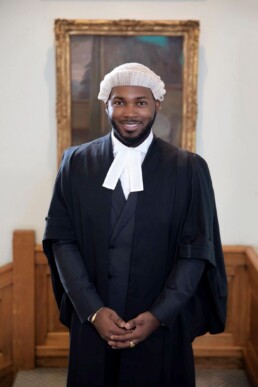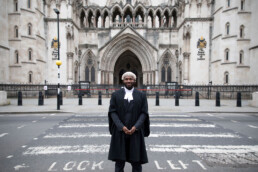Features | By John Stevenson
Against the odds: Dévante Gravesande-Smith’s journey to the Bar
To the casual observer, Dévante Gravesande-Smith represents the partial fulfilment of the dreams of any ambitious young person making their way into the competitive legal profession.
The City Law School alumnus graduated last year with a Master of Laws degree preceded by a Bar Professional Training Course (BPTC) qualification in 2019. Prior to training at City, Dévante studied for an LLB degree at Middlesex University where he graduated in 2018.
Currently working as a Clerk in the Central Criminal Court, it is easy to assume that the sky is Dévante’s limit and that nothing can prevent him from attaining his life’s ambition. It is a simple conclusion to draw if you are unaware of his backstory and the barriers this affable and soft-spoken young man has had to negotiate along the way.

The grandson of immigrants from the West Indies, Dévante grew up in Brixton’s Myatts Field Estate, notorious for gang warfare and deprivation – perhaps an unlikely environment for nursing an aspiration to become a legal professional.
As he explained in his 2020 interview with The South Londoner, he had an understanding of the issues his local community faced with police and being over policed.
Sadly, the police were not the only authority proving to be disappointing. The expectations for a young black boy educated at a local comprehensive school were low and stereotypical.
Though he sees nothing at all wrong with a career in the performing arts, Dévante observed that “many of my teachers wanted me to remain in the arts as a singer or an actor. My desire to become a barrister was viewed negatively and laughed off. One of my teachers said people like myself did not become barristers. My goal was treated with disdain.”
Dévante says he was more determined than usual from an early age because of the “values of determination and tenacity instilled in me by my West Indian grandparents and mother who settled in London in the 1950s.”
They constantly reminded him that he could be whatever he wanted to be as long as he remained resolute.
After developing an unusually early interest in politics, Dévante became a Labour Party member at 14. He remembers the 2010 General Election well. The issues of cultural diversity and immigration were important to him, surrounded as he was by a racially diverse group of school friends and a sensitivity to the plight of newly-settled families from Africa – all lending a precocious socio-political consciousness.
Though Dévante worked hard at school and eventually went on to university to bag a law degree with First Class Honours, arriving at City would mark the start of a challenging process.
To fund his £19k BPTC fees he had to join forces with his mother and sister: “We all had to work multiple jobs in several areas while I studied at City so that I could pay my fees and support myself as the BPTC was not funded by student loans.”
“The tough experience taught me a great deal about hard work and achieving a good work ethic. It was stressful – so much so, that I suffered hair loss. Sometimes when you don’t have the financial support, family support is crucial and my family has been very important to me.”
Having qualified as barrister, the necessary step of a pupillage has so far proven to be elusive:
“This is incredibly hard – my last hurdle to clear before becoming a practicing barrister. Qualified black and ethnic minority barristers still face huge barriers in securing pupillages when compared to their white counterparts. Many of us from black backgrounds who have not attended Oxbridge or a Russell Group university are already at a disadvantage in the pupillage process.”

Black barristers only make up a very small proportion of the Bar and becoming a Queen’s Counsel has also been problematic. In 2020, only one black person became a Queen’s Counsel – the set of barristers and solicitors recommended by the Lord Chancellor who have practiced for ten years and who the Queen appoints to be a part of Her Majesty’s Counsel learned in the law.
Despite these challenges Dévante advises aspiring barristers coming from deprived backgrounds to dig deep and draw on all of the resources at their disposal. He founded Beyond Youth Law, a charity initiative aiming to inform young people about their legal rights, responsibilities and recent legal developments affecting them.
Dévante says City has been invaluable in helping him cross the many hurdles he has faced.
“When I was at City, I reached out to practicing barristers and lecturers who I have kept in touch with and who have supported me in my career so far. The City Law School does a great job of supporting students with workshops, applications, mock interviews, etc, in preparing for the Bar.”
While Dévante is on the journey to obtain a pupillage, it is by no means his final stop as he hopes to establish an international legal practice with branches in the Caribbean.
The grit and determination instilled in him by his mother and grandparents will certainly be key factors in the eventual realisation of his career goals.